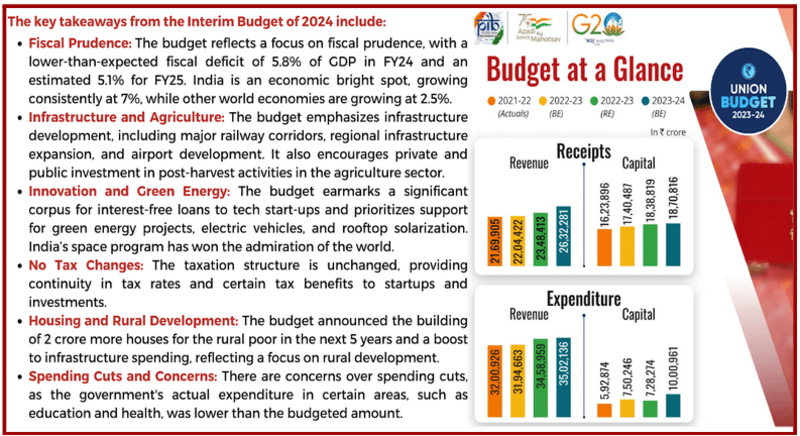A rising tide lifts all boats
Relevance: GS III (Economy)
- Prelims: Interim Budget; Government Initiatives for Health and Tourism
- Mains: Infrastructure; Interim Budget; Government Initiatives for Health and Tourism
Why in the News?
The Interim Budget has captured a decade of transformation and the opportunities ahead, in health, tourism and research in particular.

The Interim Budget (2023-24) on Preventive health checks and healthy living:
- The initiative in the Interim Budget to promote the Human Papillomavirus (HPV) Vaccination among young girls, to prevent cervical cancer, is an excellent step.
- Similar steps can be taken for several types of cancers and all non-communicable diseases, and significantly reduce India’s disease burden.
- Focus on maternal and child health care: India has made remarkable strides in health indicators over the last four decades, with a drop in infant mortality and maternal mortality.
- Maternal and child health care receives a comprehensive focus in the Budget. If mother and child are well, women’s participation in the workforce will increase even more than it has.
- Life expectancy: Life expectancy has increased from 53 years to 70 years in the last four decades. This has been achieved with less than 2% budgetary allocation for health over the years — if this can be increased to 5%, remarkable strides can be made in achieving better population health outcomes.
The Interim Budget (2023-24) on foundation for an innovation revolution:
- Innovation as a key pillar: Recently the government has decided to set aside a corpus of ₹1 lakh crore with 50-year interest-free loans to provide long-term financing and refinancing to the private sector to invest in research and technology.
- Integration of technology has the potential to create a significant impact at scale across various domains.
- Deeper Tech Collaborations: In health care, such collaborations will help us touch more lives and boost access to quality care, overcoming limitations such as the skewed doctor-patient ratio and even reducing healthcare costs significantly.
The Interim Budget (2023-24) on Medical Value Travel:
- The Interim Budget has touched upon the impact of tourism flowing from religious and iconic places and has made provision for States to promote it in a big way.
- Health care or ‘medical value travel’ is also steadily attracting more tourists and becoming a tangible reason to travel.
- ‘Heal in India’: India’s superior talent and global standards of clinical outcomes have made India a lucrative healthcare destination for the world.
- Enhancing connectivity through new corridors with the railways along with more airports and air routes has the potential to help Indians get much easier access to quality health care.
Conclusion: Even more important than what the Budget said, were the hidden figures, private expenditure and its rise, an increase in consumption, and the underlying core theme that the private sector has risen beyond all expectations to play a meaningful role in not just the economy but in how we will live our lives. And if all of us continue to work together, India will truly be limitless.
|
BEYOND EDITORIAL: Some of the challenges in implementing preventive health measures in India include:
|
Mains PYQs:
Q. One of the intended objectives of Union-Budget 15-18 is to ‘transform, energize and clean India’. Analyze the measures proposed in the Budget 15-18 to achieve the objective. (2017)
Q. Women empowerment in India needs gender budgeting. What are the requirements and status of gender budgeting in the Indian context? (2016)
Q. What is the meaning of the term ‘tax expenditure’? Taking the housing sector as an example, discuss how it influences the budgetary policies of the government. (2013)


